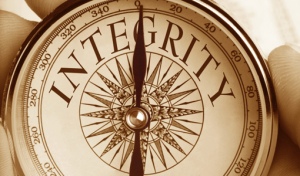“Leadership is a potent combination of strategy and character. But if you must be without one, be without the strategy” – Norman Schwarzkopf
Is there anyone doubting about the impact of ethical behavior? Is there anyone arguing about the influence of doing the right things? Whoever answers yes, should question their own integrity. And whoever they are, they are not deserved to be a leader, yet. Why did I say so? First, lets talk about the reality in today’s world.
Nowadays we often hear, “Business is Business”, “Everyone is doing it”. I guess everyone is blinded by success. Enron modified their balance sheet by hiding their debt and liabilities in order to indicate a favorable performance in public. It destroyed people’s life as well as the organization itself (Silverstein, 2013). Another case, Lehman Brothers’ accounting tricks also sent them to bankruptcy. Motorola stumbled because of their people not their technology (Ridiculous!). Witnessing that, sooner or later unethical companies will surely get exposed and the impact is not only for the company but also their people. No doubt that poor performance is a negative reflection on the leader.
Henry Adams states, “A teacher affects eternity; he can never tell where his influence stops”.
The influence that a leader can give is tremendously determining their people’s life. According to Hesselbein (2011), ethical theories which respect to leadership are related to two main categories, leaders’ behavior and leaders’ character. In addition to that, Kant in Encyclopaedia Britannica (2015) develops two theories of morality that often be used for understanding people’s behavior, Deontological ethics and TeIeological ethics. Deontological emphasizes the relationship between duty and human actions, where an action cannot simply be justified through the consequences; Virtue is the reward. Conversely, teleological refers to result-based ethics regardless the actions in the process. Personally, for the longer-term, I think deontological will be the best characteristic in sustaining people’s life as it is more about the characteristic whereas the worst scenario, teleological people could even kill others to get the desired outcome.
By now, we should have a better understanding about the underlying theories of people’s behaviors that could help us grasp the meaning of leadership easily. There are various definition of leadership, however, essentially leaders are people who lead their followers as well as inspiring them (Helmrich, 2015). Prior to that, before talking about inspiring others, leaders should have asked themselves am A being the same person in any circumstances and places? Do I want my people to behave unethically on and off the job?
“Leaders spend most of their time learning how to do their work and helping other people learn how to do theirs, yet in the end, it is the quality and character of the leader that determine the performance and results” – Frances Hesselbin –
Leaders are trailblazers; they should inspire others through their words and actions. Simply stating values without doing it means nothing and will not change anything. The basic fundamental of it, is of course consistency that is related to the values that a leader holds, which later on turns into integrity. Times are less certain today and it often tempting a leader to behave unethically and that makes Leadership becomes the top current business challenges nowadays (CMI, 2014). The key to face that challenge is depending on leaders’ integrity. If they keep on holding onto their values, they tend to have the bravery to stand against peers and situations pressure, which likely to support the long-term success of an organization.
As an example, looking back to the Aetna’s case. Ron Williams reshaped the organization by looking through the root of everything. He said, “Lets go back to the basic”, which means of reviewing their core values as an organization and as an individual (MIT, 2008). He proved it by helping Aetna back to the leader position in 7 years time (2001-2008).
Furthermore, according to environmental leader (2013), 62% of the respondents answer that the most challenging problems for a leader is managing sustainability. Haughton (2015) also defines, within financial industry; one of the ways in reducing bad behavior is by keep on strengthening companies’ ethical code of conduct; by means of leaders lead by example or they should walk their talk. If we link all the dots, it is always come back to the actions of key management. When a leader holds a great value and doing it, the organization’s performance will tell the result.
By now you should know how dangerous unethical leadership is. What will happen to the world, environment, and generations after generations if all leaders just care about themselves, the results and behave unethically?
 In this globalization era, having the smartest guy, the best strategy and the most rare resources without behaving ethically are the same with guaranteeing the short life of an organization. On the other hand, ethical leadership will create a meaningful culture inside the organization and unconsciously encourage workers to do the right thing on and off the job. So, for all the leaders out there, it is entirely up to you. You want to be a good leader with your integrity being asked or a great leader that no one knows when your influence is going to stop?
In this globalization era, having the smartest guy, the best strategy and the most rare resources without behaving ethically are the same with guaranteeing the short life of an organization. On the other hand, ethical leadership will create a meaningful culture inside the organization and unconsciously encourage workers to do the right thing on and off the job. So, for all the leaders out there, it is entirely up to you. You want to be a good leader with your integrity being asked or a great leader that no one knows when your influence is going to stop?
“You may not be able to make people change their values, however, you can help them see the wisdom of changing their behavior” –Scott Span
References:
- CMI (2014), Management 2020, [Online] available from <http://www.managers.org.uk/~/media/Files/PDF/M2020/Management%202020%20-%20Leadership%20to%20unlock%20long-term%20growth.pdf > [5 February 2015]
- Encyclopaedia Britannica (2015), Teleological ethics, [Online] available at <http://www.britannica.com/EBchecked/topic/585940/teleological-ethics > [6 April 2015]
- Environmental ladder (2013), Integrating Sustainability ‘Biggest Challenge for Business, [Online] available from <http://www.environmentalleader.com/2013/11/13/integrating-sustainability-biggest-challenge-for-business/ > [5 February 2015]
- Haughton, J (2015), US Report Lifts Lid On Ethics In Finance Firms, [Online] Available from < http://www.environmentalleader.com/2013/11/13/integrating-sustainability-biggest-challenge-for-business/ > [5 February 2015]
- Helmrich, B (2015), 30 Ways to Define Leadership, [Online] Available from <http://www.businessnewsdaily.com/3647-leadership-definition.html > [5 February 2015]
- Hesselbein, F (2011), Ethical Leadership, [Online] available from <http://www.sagepub.com/upm-data/47445_chp_16.pdf > [5 February 2015]
- MIT (2008), Leading Change: A Conversation with Ron Williams, [Online] available from <http://video.mit.edu/watch/leading-change-a-conversation-with-ron-williams-9403/ > [5 February 2015]
- Silverstein, K (2013), Enron, Ethics And Today’s Corporate Values, [Online] available from <http://www.forbes.com/sites/kensilverstein/2013/05/14/enron-ethics-and-todays-corporate-values/ > [2 February 2015]
- Span, S (2012), Leadership and Unethical Behavior: How Does It Impact the Organization? , [Online] available from <http://www.tlnt.com/2012/11/27/leadership-and-unethical-behavior-how-does-it-impact-the-organization/ > [4 February 2015]
